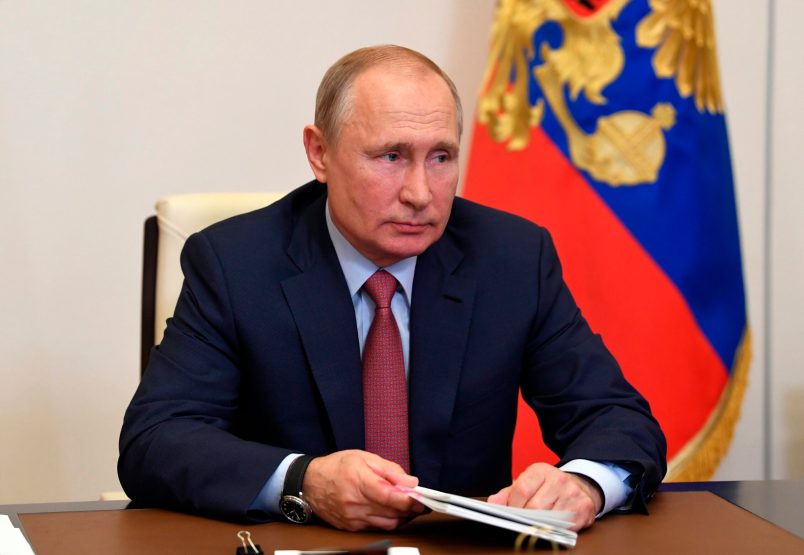Western officials have been paying closer attention to Eastern Europe in recent weeks.
A triplet of potential crises have cropped up in Russia’s relations with its neighbors to the West. Some Biden administration officials, CNN reports, fear that Russia may be stoking the tensions as a prelude to another incursion into Ukraine, while others think that it’s part of a larger leverage game.
The events have been bizarre and confusing, involving an airlift of migrants from the Middle East and armored military divisions moving towards Ukraine. Part of the action has occurred in Belarus, a Russian client state.
Here are five points on how to make sense of what’s going on.
Tensions are increasing in across swaths of Eastern Europe.
Over the past several weeks, tensions have begun to mount over Russia’s actions towards its neighbors.
Senior U.S. diplomats have met with Russian officials. CIA Director Bill Burns flew to Moscow earlier this month, where he spoke with Russian President Vladimir Putin.
That sparked a flurry of diplomatic activity between Europe and the U.S. CNN reported last week that after Burns’s trip, American diplomats began “massive outreach” to Europe about a potential Russian threat.
So what’s the cause of the budding crisis?
Three theaters of tension: Ukraine, the Baltics, and gas.
The tensions are taking place in two geographic areas: the Ukraine-Russia border, and Belarus’s border with Poland and Lithuania.
It’s all unfolding with the issue of natural gas and the coming winter heating season as a backdrop.
Russia remains the key source of natural gas for Europe. The pipelines go through Belarus, Ukraine, the Black Sea and, recently, through the North Sea.
The fact that it provides a gas supply for the winter heating season has historically allowed Russia to exert leverage on Europe and on transit countries like Ukraine that reap fees from the gas flow. Right now, Europe is debating whether to certify the Nord Stream 2 pipeline, which offers Russia a direct gas transit route to Germany passing under the Baltic Sea.
Tensions began to ramp up in October as Russia held back gas supplies to Europe, causing already-high prices to spike further as temperatures start to drop and usage goes up.
Later in October, Russia began to amass troops near its border with Ukraine. Satellite photos showed makeshift barracks and armored divisions being set up near the frontier.
But it’s Belarus that is setting off the loudest alarms.
The weirdest and most alarming escalation of tensions has been playing out along Belarus’s border with Poland and Lithuania.
It’s a region known to NATO planners as the Suwalki corridor — a narrow stretch of land that comprises the sole border between Poland and the Baltic states, buttressed by the Russian exclave of Kaliningrad on one side and Belarus on the other.
Belarusian dictator Aleksandar Lukashenka has ordered the country’s military to escort refugees to the border area, as Russia has sent nuclear-capable bombers to circle overhead.
It’s not clear exactly what Lukashenka is up to, but Belarus maintains close ties with Russia, with the two countries keeping a military alliance and allowing each others citizens to travel back and forth freely. Belarus receives massive subsidies from Moscow which have allowed it to stay afloat but also grant Russia extensive influence over its policy-making.
Refugees have been dragged into this.
This account in Deutsche Welle paints a picture of the route many of the refugees travel, paying traffickers who have deals with Belarusian embassies. Flights from Beirut, Damascus, and Amman to Minsk have increased in recent weeks, according to Germany’s foreign ministry, conceivably allowing more refugees to make the trip.
From there, the Belarusian military reportedly escorts the migrants to camps along the border.
All that has raised a divisive issue for Europe: the prospect of another, 2015-style wave of migrants.
Those stranded on the border are fleeing violent places and face a horrible situation. But their placement there, and the false promise that Belarus could serve as an easy access point to the European Union, fueled anti-immigrant protests in Warsaw this week. Poland, Lithuania, and Latvia, have all asked for EU funding to build walls along the Belarusian border.
Lukashenka, for his part, dared Poland this week to seal the country’s border, and threatened to cut off the country’s gas pipelines to Europe.
“You imposed sanctions against me, against Belarusians,” he said. “You launched a hybrid war against Belarus. And you, scoundrels, madmen, want me to protect you, from migrants?”
It’s all part of a pressure campaign that’s put NATO on edge.
Some analysts think of Lukashenka as a Kremlin stooge, while others regard him as a loose cannon whose behavior drags Moscow into situations it would rather avoid.
Reports suggest that some in the Biden administration fear another Russian incursion into Ukraine, while others see it as part of a leverage game against Europe over the gas trade and part of Moscow’s campaign to destabilize its western neighbors.
The Russian government, for its part, has taken its usual tack of only partly admitting to what’s going on.
One Russian foreign affairs journal, known for being close to the Kremlin, likened the situation to an “invasion from the north” via an analogy to Led Zeppelin’s “Immigrant Song.”
“It wasn’t always that migrants came to Europe from the south — there were time that they came from the north,” the journal’s authors wrote on the publication’s Telegram channel. “So look for yourselves, when was it better: then or now?”







Looks like someone needs to be reminded about 1998 and what can happen to an economy with only one export should the rest of the world decide they’ve crossed the line again.
Actually four.
(with a nice, tidy throughline to Russia)
Remember when the Republican Party vilified the antics and actions of Russia and its leaders? Ah, the good old days…
Deranged Donnie can appoint himself as Envoy Ambassador to work with his buddy Vlad on these issues.
Thanks, T****!